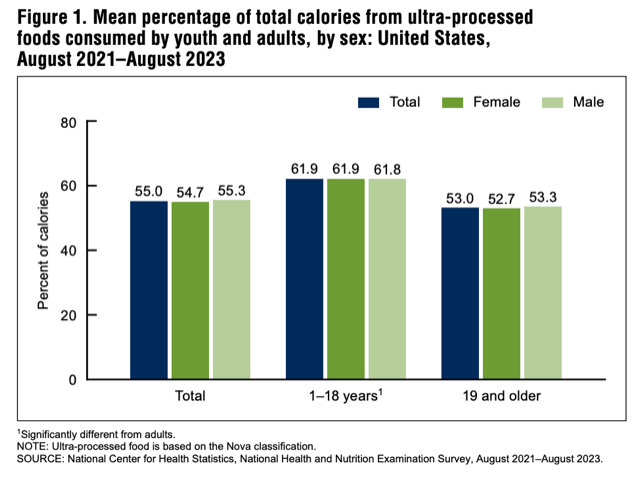Ultra-processed foods associated with obesity and chronic illness account for 62% of the calories consumed by American children, according to a study released last week by the Centers for Disease Control and Prevention (CDC).
The study, conducted by researchers Anne M. Williams, Ph.D., M.P.H., et al, also found that 53% of the calories consumed by U.S. adults, aged 19 and older, are from ultra-processed foods.
“Ultra-processed foods tend to be hyperpalatable, energy-dense, low in dietary fiber, and contain little or no whole foods, while having high amounts of salt, sweeteners, and unhealthy fats,” the researchers noted. “Ultra-processed food consumption has been associated with higher risk of cardiovascular disease and all-cause mortality.”
Among children, those between the ages of 6 and 11 years consumed the greatest percentage of calories (64.8%) from ultra-processed foods, compared to 12- to-18-year-olds at 63% and 1- to-5-year-olds at 56.1%.
For adults, the data showed the percentage of calories from these foods decreased as people grew older.
Those between the ages of 19 and 39 consumed 54.4% of calories from ultra-processed foods, compared to adults 40 to 59, who consumed 52.6%, and adults 60 and older, who consumed 51.7%.
According to the researchers, the percentage of calories from ultra-processed food did not vary for children at different family income levels.
For adults, however, the mean percentage of total calories taken in from ultra-processed foods was lower (50.4%) in those with the highest family income (350% or more than the federal poverty level), compared with the lower income levels (54.7% with family incomes less than 130% and 55.3% in those between 130%–349% of the poverty level).
The researchers found that, for children, the top five sources of calories from ultra-processed foods were “sandwiches (including burgers), which contributed 7.6% of total calories, followed by sweet bakery products (6.3%), savory snacks (4.9%), pizza (4.7%), and sweetened beverages (3.9%) (Figure 4, Table 4).”
For adults, the top five sources were “sandwiches (including burgers), which contributed 8.6% of total calories, followed by sweet bakery products (5.2%), sweetened beverages (4.4%), savory snacks (3.4%), and breads, rolls, and tortillas (3.1%).”

The study, published in a National Center for Health Statistics (NCHS) data brief, used data from the August 2021 to August 2023 National Health and Nutrition Examination Survey (NHANES) to examine “top caloric contributors and mean percentage of total calories from ultra-processed foods by sex, age, family income, and 10-year trends.”
The researchers also utilized the Nova classification system that categorizes foods according to their level of processing, from unprocessed to ultra-processed foods: (1) unprocessed, or minimally processed foods, (2) processed culinary ingredients, (3) processed foods with two or three ingredients, such as salt, oil, or sugar, and (4) ultra-processed foods, produced from “industrial formulations of processed foods that typically contain unnatural additives, such as colorings or emulsifiers.”
“Homemade foods and mixed dishes that may contain ultra-processed foods are disaggregated into their core ingredients to better categorize the sources of their calories,” the researchers noted.
As CatholicVote reported in April, Health Secretary Robert F. Kennedy, Jr. is promoting the elimination of ultra-processed ingredients such as seed oils from the diets of Americans as part of President Donald Trump’s Make America Healthy Again (MAHA) campaign.
Richard Amerling, M.D., a nephrology expert and independent medicine advocate with GoldCare, told CatholicVote at the time that a review of the timeline of the appearance of current chronic diseases is helpful to understanding how the diet of many Americans has changed our overall health status.
“When you look at the historical base in terms of what diseases were prevalent, let’s say, 100 years ago, you realize that all the diseases that we are dealing with today virtually did not exist in any significant number 100 years ago in this country,” Amerling explained. “They are all new. I call them diseases of modernity, such as diabetes, metabolic syndrome, hypertension. Coronary artery disease is basically a new disease coming up in the last century; cancer was never that common, but now it’s all over the place.”
“All these diseases, and dementia, are, I think, a result of the big modification in our food supply that occurred in the 70s and 80s, based on the [Sen. George] McGovern Commission putting out what became the Dietary Guidelines for Americans, which recommended staying away from traditional animal sources of fat and going towards these polyunsaturated vegetable oils that were made industrially,” Amerling said.
So-called “vegetable oils,” he added, are not made from vegetables, but from seeds.
“The chemical process to extract them is brutal, and they are highly toxic,” Amerling said. “They are full of double bonds, which are inherently unstable because they’re open to be oxidized, and they break down into unstable compounds like aldehydes, which are toxic – they’re precursors of inflammatory substances, various arachidonic acid derivatives that are part of the inflammatory cascade. So, they’re pro-inflammatory.”
Amerling said seed oils in snack foods have an addictive quality and often fail to provide a sense of feeling full.
“Of course, that will result in your having constantly high insulin levels, which really is the bottom line of metabolic syndrome,” he said. “And hyperinsulinemia drives all of this. And, if your insulin level’s always high, you cannot burn your own body fat. You will be in fat storage mode all the time.”
The post CDC study: 62% of US children’s calorie intake comes from ‘ultra-processed’ foods appeared first on CatholicVote org.
Click this link for the original source of this article.
Author: Susan Berry, Ph.D.
This content is courtesy of, and owned and copyrighted by, https://catholicvote.org and its author. This content is made available by use of the public RSS feed offered by the host site and is used for educational purposes only. If you are the author or represent the host site and would like this content removed now and in the future, please contact USSANews.com using the email address in the Contact page found in the website menu.








